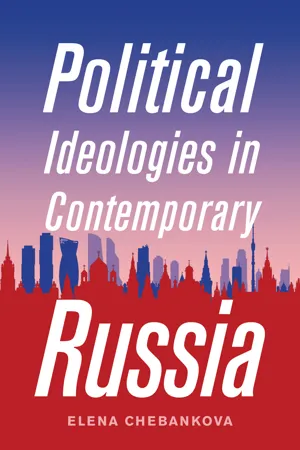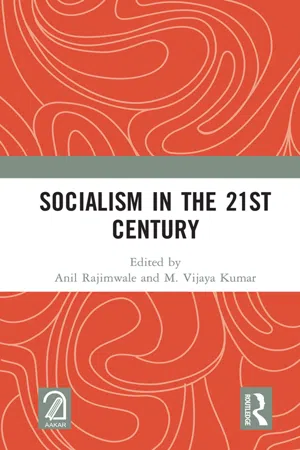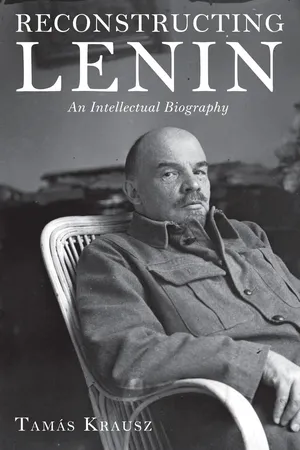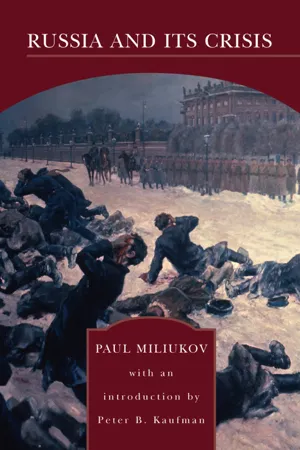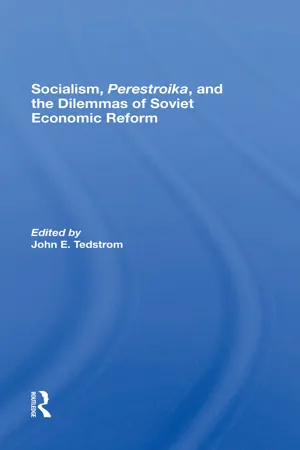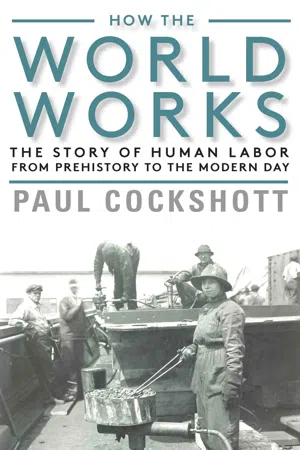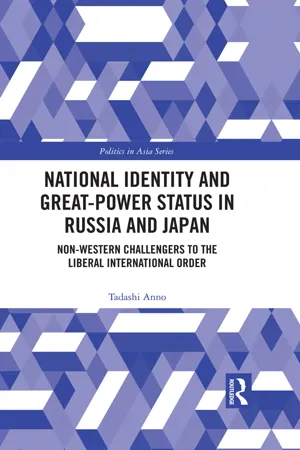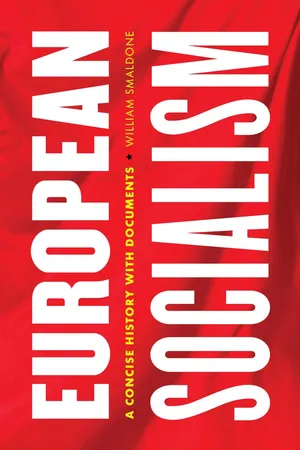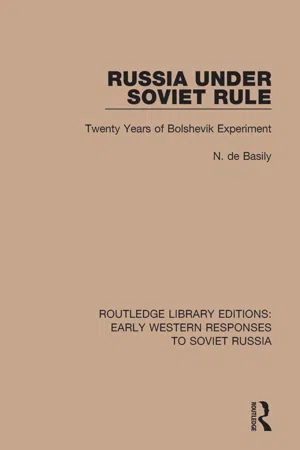History
Socialism in Russia
Socialism in Russia refers to the political and economic system that emerged in Russia following the Russian Revolution of 1917. It was characterized by the nationalization of industry, collective farming, and the establishment of a planned economy. The Bolshevik Party, led by Vladimir Lenin, played a key role in implementing socialist policies and shaping the course of Russian history.
Written by Perlego with AI-assistance
Related key terms
9 Key excerpts on "Socialism in Russia"
- eBook - ePub
- Elena Chebankova(Author)
- 2020(Publication Date)
- McGill-Queen's University Press(Publisher)
The Soviet state attempted to achieve this end in the most comprehensive manner to date but failed due to various historical reasons – an underdeveloped working class, an insufficient technological base, international pressures, and an overly powerful bureaucracy that appropriated the gains of the October 1917 revolution (Tretyakov 2017; Kurginyan 2018). From this point of view, Russian revolutionaries launched a project that leapt hundreds of years towards the future, even though attempts to fulfil it at that point were futile. Nevertheless, the metaphysical essence of this project, its ideational, anthropocentric, and cultural foundation, remains a distant ideal for masses of people around the world who are striving for a just society. Therefore, in retrospect, the Soviet state should not be examined as an alternative to contemporary capitalism. Rather it must be viewed as a futuristic experiment which was attempted prematurely at a particularly problematic junction of history. Some Western scholars concur with this approach. Malia, for example, argues that ‘socialism, as the just and humane system, is not an alternative to, but is higher than capitalism. So, socialism also comes to mean the culmination of history, the telos of human development; in this guise, it generates a theory of history, or shades off into what has been called meta-history or “historiosophy”’ (Malia 1994, 22). From this point of view, socialism as a system and ideology of organizing social life can not be dead or dated as long as humans are striving for a fairer society, justice, equality, and creative freedom. As Jean-Paul Sartre declared, socialism is ‘an inescapable horizon of our age’ (cited in Malia 2006, 184). More importantly, Malia claims that the modern project of democracy treats the ideas of equality as a target towards which society must evolve - eBook - ePub
- Anil Rajimwale, M. Vijaya Kumar, Anil Rajimwale, M. Vijaya Kumar(Authors)
- 2020(Publication Date)
- Routledge(Publisher)
Socialism in the 20th Century A ReassessmentRameshwar Dass and Laxman Singh ShekhawatThe concept of socialism came into existence since the beginning of the modern era in a specific historical context. It was at this time that scholars like Thomas Moore (1478–1535), Saint Simon (1771–1858) and Charles Fourier (1772–1837) saw socialism as a “theory of an ideal society based on equality”. They elaborated on the concept in terms of their own social experiences, imaginations and explanations. Some of them, like Robert Owen and Fourier tried to create such a society in their own locality and were impoverished in the process. History called them Utopian Socialists as their efforts and the principles were both based on subjectivism. Despite failure, these thoughts and efforts underlined the need for socialism and created the ground for the future.It is now an accepted fact that with the rise of Marxism, the scientific theory of socialism also came into being. Marx and Engels had formulated the concept of socialism while developing the theme of dialectical materialism and analysing the principles of motion in human society on the basis of the process of development of the means of production in capitalism. They had visualised that the next phase of development of the developed capitalism would lead towards socialism, but the fact remains that no such revolution has been witnessed in any such country and it certainly needs to be deliberated.The first proletarian revolution took place in Russia on the basis of principles developed by V.I. Lenin and propounded by Marx and Engels. Lenin had prepared the theoretical grounds of the revolution saying that semi-feudal and semi-industrialised Russia was a weak link in the imperialist stage of capitalism in the world. He had calculated that the “weak link” could be broken easily, and hence led the revolution. It was considered to be the greatest revolution in human history and was taken as the beginning of a new age where capitalism would have met its end and human society would have reached communism after passing through the stage of socialism. At the instance of Lenin, Communist International was formed and the world communist movement received a great impetus and inspiration. In many countries, socialist, communist and democratic parties were formed and later in East Europe, China, Vietnam, Cuba, North Korea and many other countries, socialist and proletarian revolutions took place. It was expected that the wave of communism would spread around the world, but it did not happen. In fact, instead of capitalism, there was the downfall of socialism itself. In the Soviet Union, the social system advanced forward with its achievements and shortcomings, but after seventy years, collapsed like a house of cards. The expectations and hopes of those, who had dreams of socialism and were involved in struggles to achieve it, met with a dead end. The socialist countries in East Europe too faced a similar fate along with Soviet Russia. The countries (Cuba, China, Vietnam, etc.) that could save the system can hardly be called socialist any more. - eBook - ePub
Reconstructing Lenin
An Intellectual Biography
- Tamás Krausz, Balint Bethlenfalvy(Authors)
- 2015(Publication Date)
- Monthly Review Press(Publisher)
8 The Theory of Socialism: Possibility or Utopia? I N OCTOBER 1917 LENIN SURELY must have believed that history had confirmed his political and theoretical convictions, plans, and prophecies to a surprising degree. But after October he would observe that not a single one of his prognoses had been validated, or if they were—as in the case of the civil war—their form and course was accompanied by unforeseen catastrophes. All of this weighed heavily on the development of his theory of socialism. To begin with, a majority of the Mensheviks interpreted the October Revolution as a form of bourgeois revolution (with numerous movements to follow in their footsteps), a factor that came to mark the perimeters of the debate around this issue. 1 If the theoretical deductions of Lenin’s work and his perspectives on socialism are viewed from the angle of his last writings, from 1922 to 1923, a reconstruction of the formative history of his intellect is unavoidable. 2 Foremost, though, his theory illustrates a neatly presentable framework and conception. To reach intellectual maturity it had to come under the influence of five phases of development, clearly defined in terms of political history. The first phase covers the period prior to the 1905 Russian Revolution, and the second period stretches to the October Revolution, whose results were summarized in the work State and Revolution. But after 1917, the statesman Lenin was no longer in a position to write a theoretical prospectus and not simply due to a lack of time. Developments were not yet susceptible to classical analysis - Paul Miliukov(Author)
- 2009(Publication Date)
- Barnes & Noble(Publisher)
Russian socialism met with no opposition from the individualistic spirit, and found no organized democracy. Every page of the social history of Russia explains why it is so. We have seen that the bourgeoisie did not exist in Russia, and that that country never developed such an intense social life as that which in mediæval Europe succeeded in balancing the central power of absolute monarchy, and which in modern Europe is sufficient to hold in check the absolute democracy of the socialism of today. Whatever in these conditions was unfavorable to individualism and liberalism favored, and still favors, collectivism in Russia. This also is the reason why it was not so easy for socialism itself to become a class doctrine in Russia. Socialism as well as liberalism for a long time remained “intellectual”; and if liberalism was so because it was opposed to the interests of its own class, socialism was so because — and as long as — it represented the class which was as yet unable to speak in its own name and to articulate its own demands. The next consequence of this similarity of conditions was that Russian liberalism and Russian socialism were not at all mutually exclusive. Russian liberalism was always tinged with democratism, and Russian democratism has been strongly impregnated with socialistic teachings and tendencies ever since socialism made its appearance. To be sure, the modern — and predominant — socialistic doctrine in Russia today is a strictly class doctrine — that of the German socialistic democratism of Marx; but we shall see that the other large division of Russian socialism still clings to the former Russian idea: the negation of every class distinction, rather than the self-assertion of only one class, the “proletariat.”The main point in the history of Russian socialism is this change from the latter point of view to the former — a transition which was only gradually taking place. We designated the modern view as that of the “scientific” socialism of Marx. We may designate the earlier view as that of “utopian socialism” — or the anarchism of Bakoonin. Bakoonin and Marx — the beginning and the end of Russian socialism! The fundamental conception of the Marxist view is that the class-consciousness of the “proletarians” is gradually and necessarily rising with the development of capitalism, and that the proletariat must take possession of the political power, in order to consummate the social revolution which had already been prepared by the whole process of economical development. The view of Bakoonin was that the masses are and always have been socialistic, and that the Russian — or rather the Slav — masses are so in particular, because they live under the régime of communal property. They need not to be taught socialism; they need only to be awakened: the whole remaining task of changing the social order will be accomplished by the masses themselves, from beneath by way of the free federation of communes.- John E Tedstrom(Author)
- 2019(Publication Date)
- Routledge(Publisher)
The more radical the reformer, the more likely he or she is to mock the existing system under such epithets as "barracks socialism," "bureaucratic socialism," or "the socialism of War Communism" Of course, a lot depends on how "socialism" is defined. If all that is meant is public ownership of the means of production, then the USSR qualifies. The economist (and deputy prime minister) Leonid Abalkin argues, however, that socialism means more than that. He has advanced two criteria to determine whether or not a system is socialist. First, there is the economic criterion: "If socialism is a higher stage of social development [than capitalism], it must outdo its predecessor in efficiency, quality, productivity, and rate of innovation." The Soviet economy does not, of course, outstrip the capitalist world in these respects. Abalkin's second criterion is social, and in this respect too the USSR fails the test. Socialism, he says, should "guarantee everyone a minimum standard of living, a lower limit of social well-being." If a system "fails to make the individual feel master in his own workplace," Abalkin concludes, "then the system is not socialist." 2 Along with other reformist economists, Abalkin argues that the Soviet system of property relations is at the root of the problem, since it is held to be property relations that primarily distinguish socialism from capitalism. 3 He would doubtless agree with the Polish economist Wlodzimierz Brus that "socialism entails a particular concept of property rights—a system of ownership whereby society is genuinely in control of the means of production and benefits from their use." Brus goes on to fault official Soviet ideology for automatically equating "nationalization," or the taking of capital into public or state ownership, with "socialization." 4 On this too Abalkin would be likely to concur- eBook - ePub
How the World Works
The Story of Human Labor from Prehistory to the Modern Day
- Paul Cockshott(Author)
- 2020(Publication Date)
- Monthly Review Press(Publisher)
111Socialist economies have the same basic mode of production as capitalism: machine industry and agriculture. What distinguishes them are the forms of property and the way in which the surplus product is determined.Actual countries have shown mixtures of socialist and other production relations. Socialism may exist as a subsystem within countries that are predominantly capitalist, and capitalism or domestic peasant economy may exist as subsystems in predominantly socialist economies. Though political revolutions may permit changes in property relations, they are, at least in the short term, powerless to effect a change in the mode of production. The 1917 Revolution was no more able to establish the socialist mode of production than the revolutions of 1776 or 1789 were able to establish the capitalist mode of production. The establishment of Socialism in Russia, as with the establishment of capitalism in North America and France, came later with a sequence of changes in production technologies and economic relations. It took France until 1900, over a century after the revolution, to achieve the degree of urban industrial development that Russia achieved in less than a quarter-century after 1917.112 Arguably the transition to capitalism in France and that to Socialism in Russia was not complete until the 1960s. That these changes in the mode of production took place much faster in the Russian case does not obscure the fact that changes in the mode of production take time. If capitalism and socialism’s shared mode of production already largely exists, as in Germany or Czechoslovakia post-1945, the change to socialism can occur much faster.Socialism was born from political successes by working-class and peasant movements, not spontaneous economic development.It was produced by movements that had socialism as an objective. But this is not so different from capitalism in most of the world. The socialist movement had its economic theorists, whose ideas in their turn influenced socialist governments. But this is not so different from capitalist governments. They too have been influenced by economists advocating an ideal type of capitalist society. The theory of free-market capitalism developed well before capitalism was established as an international system. Its spread, by British bayonets and gunships, showed the Chinese in the generations before Mao where the political power needed for social transformation came from. - eBook - ePub
National Identity and Great-Power Status in Russia and Japan
Non-Western Challengers to the Liberal International Order
- Tadashi Anno(Author)
- 2018(Publication Date)
- Routledge(Publisher)
In contrast to the conservatives and to the liberals, socialists called for a radical transformation of the international order. For them, the war represented a crisis of liberal capitalism, and the way out lay only in a global socialist revolution. What complicated the picture for Russian socialists was the fact that leading socialist parties of Europe, such as the German Social Democratic Party (SPD) and the French Section of the Workers’ International (SFIO), came out in support of their respective government’s war effort, despite their pledge not to support the war efforts of bourgeois governments. Socialists were thus faced both with the anticipated crisis of the capitalist international order, and with the unexpected crisis of socialist internationalism. Some socialists held that, despite the “betrayal” of leading socialist parties, Europe will continue to lead the path to socialism. For them, the war meant a crisis of capitalism, not of European socialism. But for other socialists – the Bolsheviks in particular – mainstream European socialism was now bankrupt, and Russia had a leading role to play in the coming global transformation. The Bolsheviks, in effect, argued that Russia could lead a “revolution from below” in international affairs. In order to understand the nature and origin of this idea, we must review the transformation of Russian Marxism in the years between 1905 and 1917.The earliest Russian students of Marx were agrarian socialists known as narodniki , who enlisted Marx’s indictment of capitalism in support of their idea of an “original” socialist path for Russia. But narodniki ’s vision of an agrarian socialist revolution looked less convincing after 1881, when assassination of Alexander II failed to incite an expected peasant uprising. The emergence of a sizable class of factory workers under Witte’s industrialization program led increasing number of critical progressives to accept Marxism as a more promising revolutionary theory.In contrast to Populism, Marxism came to Russia as an ideology of industrialization and Westernization. Georgii Plekhanov, the father of Russian Marxism, stressed that Russia must pass through the same developmental stages as did Western European states (Baron 1963). For backward Russia, the immediate task would be a bourgeois-capitalist revolution; a socialist revolution can occur only after extended capitalist development. The proletariat of the advanced countries were destined to play a leading role in the coming socialist transformation (Baron 1963, 164–185).Yet this view did not remain universally accepted. The mass protests and uprisings of 1905 suggested – contrary to standard theory – that Russia may be prone to revolutionary upheavals precisely because of “backwardness” and of military weakness. At a more theoretical level, the experience of 1905 showed that external events can cause domestic revolutions, irrespective of the degree of the country’s socioeconomic development - eBook - ePub
European Socialism
A Concise History with Documents
- William Smaldone(Author)
- 2019(Publication Date)
- Rowman & Littlefield International(Publisher)
While Western Europe was home to a wide range of socialist mass parties by the turn of the century, in Eastern Europe, especially in Russia, socialism’s progress was slower. In part, this was due to the nature of Russia’s economic and social development. Although industrialization advanced rapidly, growth was uneven, and the country remained overwhelmingly agricultural: the growing urban proletariat was dwarfed by the peasantry, and Russia’s emerging middle classes were economically and politically impotent when compared to their Western counterparts. Most decisive, though, for the slow development of the labor movement was the state’s ruthless suppression of all political and trade union activity. Unlike workers in the West, who, despite continued oppression, could organize openly, Russian activists could operate only clandestinely.Two groups dominated the socialist political landscape around 1900. Led by Victor Chernov (1873–1952), the Socialist Revolutionary Party (socialist revolutionaries) acted in the tradition of the populist People’s Will and did not shy away from using terror against the tsarist state. It sought a democratic republic resting on broad local autonomy, self-determination for national minorities, social security for workers, and, most important, “socialized” agriculture controlled by peasant communes. The socialist revolutionaries did not oppose industrialization but aimed to halt Russia’s march toward capitalism. Socialist industrial development would follow the development of socialist relations in the countryside, which they believed would go forward without need for compulsion among the peasants.The Russian Social Democratic Labor Party (RSDLP), on the other hand, followed in the footsteps of Plekhanov, who had insisted that Russia would have to pass through a bourgeois-democratic revolution and a prolonged period of capitalist development before a proletarian revolution could establish socialism. Founded in 1898, the party soon divided into two hostile camps over the issue of how to pursue revolution in Russia. Vladimir Ilyich Ulyanov (1870–1924), better known by the pseudonym Lenin, led the Bolshevik (majority) faction. Born in Simbirsk into the family of an ennobled school inspector, Lenin was intellectually gifted, energetic, and disciplined. After his brother, Alexander, was executed for conspiring to assassinate Tsar Alexander III in 1887, Lenin, too, became a devoted revolutionary. He completed a law degree in 1892, discovered Marxism, and joined the nascent social democratic movement. After he met Plekhanov in Geneva in 1895, the police arrested him on his return home, and he spent three years in Siberian exile. Following his release, he went back to Western Europe, where, to paraphrase one comrade, he “thought and dreamt of nothing but revolution—twenty four hours a day.”15 - eBook - ePub
Russia Under Soviet Role
Twenty Years of Bolshevik Experiment
- N. de Basily(Author)
- 2017(Publication Date)
- Routledge(Publisher)
2Lenin was at this time entirely under the sway of his illusions. “Our Revolution”—he wrote to the workers of St. Petersburg—“has succeeded in coming to immediate grips with the concrete and practical realization of Socialism.”1 “We are fighting at present for the principle of communist distribution,” he announced on June 4, 1918, in connection with the decree regulating food supplies.Speaking of the Peasant Pauper Committees which had been formed in the villages to suppress the kulaks,2 a last remnant of the bourgeois régime, Lenin said, at the VIth extraordinary congress of the Soviets that this measure would definitely establish Socialism in the villages: “We have made a gigantic stride forward, one of a universal, historic importance; a step which the most democratic republican States have not yet dared to take. The poor peasants, closely following the urban workers, now at last form a solid and definite basis for the real construction of Socialism. It is a tremendous change which, within such a short space of time, has led us to Socialism in the villages.”3End of Lenin’s Socialist IllusionsHere then was Socialism rooted in the towns and the villages. Could this illusion last? Certainly not. By the end of 1920 foreign troops no longer occupied any part of the Soviet territory. On November 14th of that year, the White Army of General Wrangel evacuated the Crimea and was shipped abroad. The Bolsheviks were now able to shake off warlike exaltation, and to come down from the realm of dreams into that of stern realities. What was the picture before Lenin’s eyes? He saw that his dissertations about capitalist monopolies evolving directly into Socialism were ill-founded. He realized that there was no Socialism in Russia, but merely “War Communism,” the Communism of a besieged and blockaded country, starved and reduced to misery after the bitter ordeal of external war followed by a cruel civil war. During the Great War all Western countries had practised that kind of Communism and had repealed it with relief the moment the War was over. And yet it was precisely this state of things caused by the War that, according to Lenin, was to give birth to Socialism. Lenin was too intelligent not to admit the mistake he had made through his ardent faith in the immediate advent of Socialism. He had the courage to declare: “This peculiar ‘War Communism’ consisted in taking from the peasants the surplus of their produce, and sometimes even a part of what was necessary for their subsistence. We have made requisitions to keep up the Army and maintain the workers. These requisitions were generally made on credit and paid in paper money. Had we acted otherwise, we could not have mastered the landowners and capitalists. ‘War Communism’ was necessitated by the war and by the ruin of the country. It has not been and could not be a policy answering to the economic needs of the proletariat. It was but a temporary measure.”1
Index pages curate the most relevant extracts from our library of academic textbooks. They’ve been created using an in-house natural language model (NLM), each adding context and meaning to key research topics.
